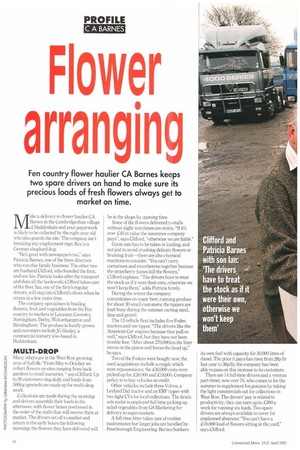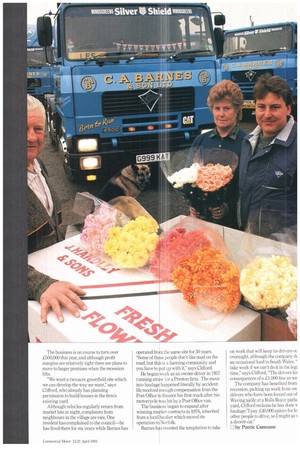Flower arranging
Page 46

Page 47

If you've noticed an error in this article please click here to report it so we can fix it.
Make a delivery to flower haulier CA Barnes in the Cambridgeshire village of Haddenham and your paperwork is likely to be collected by the eight-year old who also guards the site. The company isn't breaking any employment regs; Rex is a German shepherd dog.
"He's good with newspapers too," says Patricia Barnes, one of the three directors who run this family business. The other two are husband Clifford, who founded the firm, and son Ian. Patricia looks after the transport and does all the bookwork; Clifford takes care of the fleet. Ian, one of the firm's regular drivers, will step into Clifford's shoes when he retires in a few years time.
The company specialises in hauling flowers, fruit and vegetables from the Fen country to markets at Leicester, Coventry, Nottingham, Derby, Wolverhampton and Birmingham. The produce is locally grown and customers includeJG I lanley, a commercial nursery also based in Haddenhaxn.
Niany (Alias areiii the West Row growing area of Suffolk: "From May to October we collect flowers on sites ranging from back gardens to small nurseries, "says Clifford. Up to 30 customers ring daily and loads from 500kg upwards are made up for multi-drop work.
Collections are made during the morning and drivers assemble their loads in the afternoon, with flower boxes positioned in the order of the stalls that will receive them at market. The drivers set off to market and return in the early hours the following morning; the flowers they have delivered will
be in the shops by opening time.
Some of the flowers delivered to stalls without night watchmen are stolen. "If it's over £40 in value the insurance company pays", says Clifford, "otherwise we are liable."
Great care has to be taken in loading, and not just to avoid crushing delicate flowers or bruising fruit—there are also chemical reactions to consider. "You can't carry carnations and strawberries together because the strawberry fumes kill the flowers," Clifford explains. "The drivers have to treat the stock as if it were their own, otherwise we won't keep them," adds Patricia firmly.
During the winter the company concentrates on sugar beet, running produce for about 30 small customers: the tippers are kept busy during the summer carting sand, lime and gravel.
The 13-vehicle fleet includes five Foden tractors and one tipper. "The drivers like the American Cat engines because they pull so well," says Clifford, but they have not been trouble-free: "After about 270,000lun the liner moves in the piston and forces the head up," he says.
Two of the Fodens were bought new; the used acquisitions include a couple which were repossessions; the £40,000 units were picked up for £26,000 and £18,000. Company policy is to buy vehicles on credit.
Other vehicles include three Volvos, a Leyland Daf tractor and an ERF tipper with two light CVs for local collections. The firm's sole reefer is employed full time picking up salad vegetables from GS Marketing for delivery to supermarkets.
A full-time fitter takes care of routine maintenance but larger jobs are handled by Peterborough Engineering. Barnes bunkers its own fuel with capacity for 30,000 litres of diesel. The price it pays has risen from 28p/lit last year to 36p/lit; the company has been able to pass on this increase to its customers.
There are 14 full-time drivers and a veteran part-timer, now over 70, who comes in for the summer to supplement his pension by taking the light commercials out for collections in West Row. The drivers' pay is related to productivity; they can earn up to £300 a week for running six loads. Two spare drivers are always available to cover for unplanned absences: "You can't have a £10,000 load of flowers sitting in the yard," says Clifford. The business is on course to turn over £500,000 this year, and although profit margins are relatively tight there are plans to move to larger premises when the recession lifts.
"We want a two-acre greenfield site which we can develop the way we want," says Clifford, who already has planning permission to build houses in the firm's existing yard.
Although vehicles regularly return from market late at night, complaints from neighbours in the village are rare. One resident has complained to the council—he has lived there for six years while Barnes has operated from the same site for 30 years. "Some of these people don't like mud on the road, but this is a farming community and you have to put up with it," says Clifford.
He began work as an owner-driver in 1957 running straw for a Preston firm. The move into haulage happened literally by accident. He received enough compensation from the Post Office to finance his first truck after his motorcycle was hit by a Post Office van.
The business began to expand after winning market contracts in 1976, inherited from a local haulier which moved its operation to Norfolk.
Barnes has resisted the temptation to take on work that will keep its drivers on overnight, although the company d( an occasional load to South Wales. " take work if we can't do it in the legi time," says Clifford, "The drivers kn consequences of a £1,000 fine as we The company has benefited from recession, picking up work from ow drivers who have been forced out of Waving airily at a Rolls Royce park( yard, Clifford reckons he has done v haulage:"I pay £40,000 apiece for lo other people to drive, so I might as a decent car."
CI by Patric Ctumane
















































































